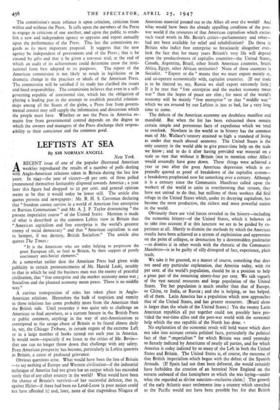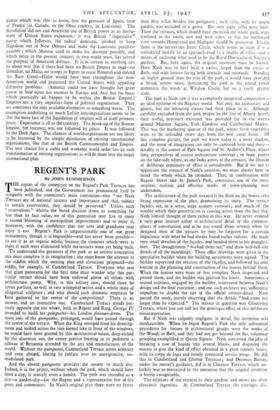LEFTISTS AT SEA
By SIR NORMAN ANGELL
New York.
ARECENT issue of one of the popular illustrated American weeklies reproduced the results of a number of polls dealing with Anglo-American relations taken in Britain during the last few years. In 1945—the year of victory-58 per cent. of those polled pronounced themselves favourably disposed towards America ; a year later this figure had dropped to 22 per cent. and general opinion seems to be that it would today be lower still. The article also quotes persons and newspapers: Mr. R. H. S. Grossman declaring that " freedom cannot survive in a world of American free enterprise or Russian Communism " and Mr. A. I. P. Taylor denouncing " the present imperialist course " of the United States. Mention is made of what is described as the common Leftist view in Britain that "American capitalism and free enterprise is the world's greatest enemy of social democracy " and that " American capitalism is out to hamper, if not destroy, British Socialism." The article also quotes The Times : "It is the Americans who are today helping to perpetuate the great European rift, so fatal to Britain, by their support of purely reactionary anti-Soviet elements."
At a somewhat earlier date the American Press had given wide publicity to certain pronouncements of Mr. Harold Laski, notably to that in which he said the business man was the enemy of peaceful civilisation, that " free enterprise and the market economy mean war ; Socialism and the planned economy mean peace. There is no middle way."
A curious transposition of roles has taken place in Anglo- American relations. Heretofore the bulk of suspicion and enmity in those relations has come probably more from the American than the British side. Until yesterday it was quite safe to challenge an. American to find anywhere, as a current feature in the British Press or public comment, anythiqg in the way of anti-Americanism to correspond to the savage abuse of Britain to be found almost daily in, say, the Chicago Tribune, in certain organs of the extreme Left or in a large number of books turned out each year in America. It would seem—especially if we listen to the critics of Mr. Bevin- that one can no longer throw down that challenge with any safety. Even American prosperity hashecome, particularly in Leftist quarters in Britain, a cause of profound grievance.
. Obvious questions arise. What would have been the fate of Britain —to say nothing of Europe and Western civilisation—if the industrial technique of America had not given her an output which has exceeded vastly that of any other country in the world? What would have been the chance of Britain's survival—of her successful defence, that is, against Hitler—if there had been no Lend-Lease (a poor nation could not have afforded it) and, later, none of that stupendous Niagara of
American material poured out to the Allies all over the world? And what would have been the already appalling condition of the post- war world if the resources of that American capitalism which excites such vocal wrath in Mr. Bevin's critics—parliamentary and other— had not been available for relief and rehabilitation? Do those in Britain who indict free enterprise so ferociously altogether over- look the fact that for many years Britain's very life will depend upon the productiveness of capitalist countries—the United States, Canada, Argentina, Brazil, other South American countries, South Africa, Egypt, other African territories? None of these countries is Socialist. " Export or die " means that we must export mainly to, and co-operate economically with, capitalist countries. (If our trade is to be limited to, say, Russia we shall export extremely little.) If it be true that "free enterprise and the market economy mean war " then the hopes of peace are slim ; for most of the world's economy will be mainly "free enterprise" or that "middle way" which we are assured by our Leftists is just as bad, for a very long time to come.
The defects of the American economy are doubtless manifest and manifold. But when the list has been exhausted there remain certain simple and portentous facts of expedience which we tend to overlook. Nowhere in the world or in history has the common man of Mr. Wallace's'oratory attained so high a standard of living as under that much abused economy. The United States is the only country in the world able to give peace-time help on the scale we know ; and to do it after having provided war material on a scale so vast that without it Britain (not to mention other Allies) would assuredly have gone down. These things were achieved a year or two after the great American depression which is re- peatedly quoted as, proof of breakdown of the capitalist system— a breakdown prophesied now for something over a century. Although it is a century since the Communist Manifesto called upon the workers of the world to unite in overthrowing that system, they have not united to do that, but millions of those workers did find refuge in the United States which, under its decaying capitalism, has become the most productive, the richest and most powerful nation in the world.
Obviously there are 'vital forces revealed in the history—including the economic history—of the United States, which it behoves us to take into account if at this juncture we are to be guided by ex- perience at all. Merely to dismiss the methods by which the American results have been achieved as a system of exploitation and oppression on the point of collapse, or destruction by a downtrodden proletariat —to dismiss it in other words with the rhetoric of the Communist Manifesto—is to be guilty of silly disregard of fact, experience, plain truth.
We take it for granted, as a matter of course, something that does not need any particular explanation, that America today, with six per cent. of the world's population, should be in a position to help a great part of the remaining ninety-four per cent. We talk vaguely of the vast natural resources and large population of the United States. Yet her population is much smaller than that of Europe, or China, or India, or Russia ; and she is. helping, or has helped, all of them. Latin America has a population which now-approaches that of the United States, and has greater resources. (Brazil alone is larger than the whole of the. United States.) Yet the twenty Latin American republics all put together could not possibly have pro- vided the war-time allies and the post-war world with the economic help which the one republic of the North has done. • No explanation of the economic result will 'hold water which does not take into account certain political facts, particularly the-political fact of that " imperialism" for which Britain was until yesterday so fiercely indicted by Americans of nearly all parties, and for which America is today indicted by so many of the Left in both the United States and Britain. The United States is, of course, the outcome of that British imperialism which began with the defeat of the Spanish Armada. (If Spain had not then been defeated, she would certainly have forbidden the creation of an heretical New England on the eastern seaboard of that hemisphere to which she was laying—under what she regarded as divine sanction—exclusive claim.) The growth of the early Atlantic coast settlements into a country which stretched to the Pacific would not have been possible but for that British
power which was able to resist, first the pressure of Spain, later of France (in Canada, in the Ohio country, in Louisiana). The Revolution did not end American use of British power as an instru- ment of United States expansion: it was British " imperialist " power which Jefferson, the radical democrat, invoked to keep Napoleon out of New Orleans and make the Louisiana purchase possible ; which Monroe used to make his doctrine possible, and which twice in the present century, in two-world wars, has served the purpose of American defence. It is as certain as anything can be about war that if there had been no British Empire in 1940—no Gibraltar, no Malta, no troops in Egypt to resist Rommel and defend the Suez Canal—Hitler would have won throughout the non- American world and presented the United States with appalling defensive problems. (America could not have brought her great power to bear upon her enemies in Europe and Asia but for bases which practically all happen to be within the British Empire.) Empires are a very imperfect form of political organisation. They are sometimes the only available alternative to something worse. The assumption underlying so much Leftist anti-imperialism seems to be that the mere fact of the liquidation of empires will of itself promote peace. Experience is all to the contrary. The, break-up of the Roman Empire, for instance, was not followed by peace. It was followed by the Dark Ages. The chances of world-organisation are not likely to be increased by the simple dissolution of existing international organisations, like that of the British Commonwealth and Empire. The best chance for a stable and workable world order lies in such transformation of existing organisations as will, fit them into the larger international plan.



































 Previous page
Previous page